INTERNACIONAL
Experts warn Iran’s nuclear double-talk designed to buy time, undermine US pressure

Senior Iranian officials are threatening to ramp up the country’s nuclear program as the Trump administration weighs a possible strike against the regime if Tehran does not come to the table for negotiations.
«The president should be making the regime sweat, pure and simple,» Behnam Ben Taleblu, an Iran expert and senior fellow at the Foundation for Defense of Democracies, told Fox News Digital.
«This can be done with strict enforcement of maximum pressure sanctions, and a targeted campaign against regime assets in the region – Yemen being a good example now. Washington will also need to add a critical third element to its otherwise economic and military pressure policy. Maximum support for the Iranian people.»
IRAN’S KHAMENEI WARNS OF ‘STRONG BLOW’ AS TRUMP THREATENS TO DROP BOMBS, PUTIN SILENT ON US IRE
An Iranian military truck carries surface-to-air missiles past a portrait of Iran’s Supreme Leader Ayatollah Ali Khamenei during a parade on the occasion of the country’s annual army day on April 18, 2018 in Tehran, Iran. (ATTA KENARE/AFP via Getty Images)
Lisa Daftari, a Middle East expert and editor-in-chief at The Foreign Desk, told Fox News Digital that while diplomacy often demands negotiation, extending any offer to Iran’s regime, even symbolically, risks legitimizing a government that has spent decades terrorizing its own people and funding proxies like Hamas, the Houthis and Hezbollah.
«This regime thrives on defiance, not dialogue. That has not changed. For over four decades, the mullahs have understood only one language: might,» Daftari said.
President Donald Trump told reporters on Air Force One on Thursday that it would be better if the U.S. had direct talks with Iran.
«I think it goes faster, and you can understand the other side a lot better than if you go through intermediaries,» Trump said. «They wanted to use intermediaries. I don’t think that’s necessarily true anymore. I think they’re concerned. I think they feel vulnerable, and I don’t want them to feel that way.»
Trump also threatened to bomb Iran and impose secondary sanctions on Iranian oil if it did not come to the bargaining table over its nuclear program. Although the president said he preferred to make a deal, Trump did not rule out a military option.
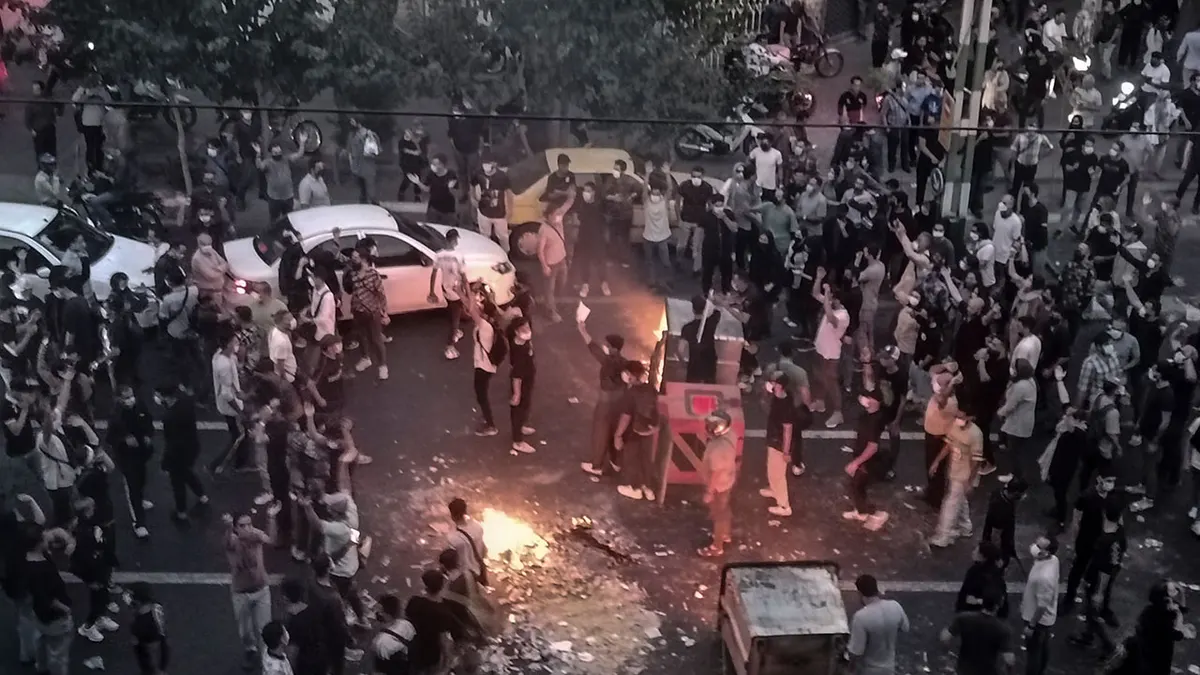
Iranians protest 22-year-old Mahsa Amini’s death after she was detained by the morality police, in Tehran, Iran, on Sept. 20, 2022. (AP Photo/Middle East Images, File)
«It will be bombing the likes of which they have never seen before,» President Trump told NBC News last weekend.
The U.S. expanded its deterrence efforts in the region, deploying additional squadrons of fighter jets, bombers, and predator drones to reinforce defensive air-support capabilities. The U.S. is also sending the USS Carl Vinson Carrier Strike Group to the region to join USS Harry S. Truman, which has been in the Middle East to fight against the Houthi’s in Yemen.
Iran’s supreme leader, Ali Khamenei, responded with threats of his own and said that Iran would respond «decisively and immediately» to any threat issued by the U.S. Iran is still floating the idea of indirect talks, something the administration is reportedly considering.
WALTZ TELLS IRAN TO GIVE UP NUCLEAR PROGRAM OR ‘THERE WILL BE CONSEQUENCES’
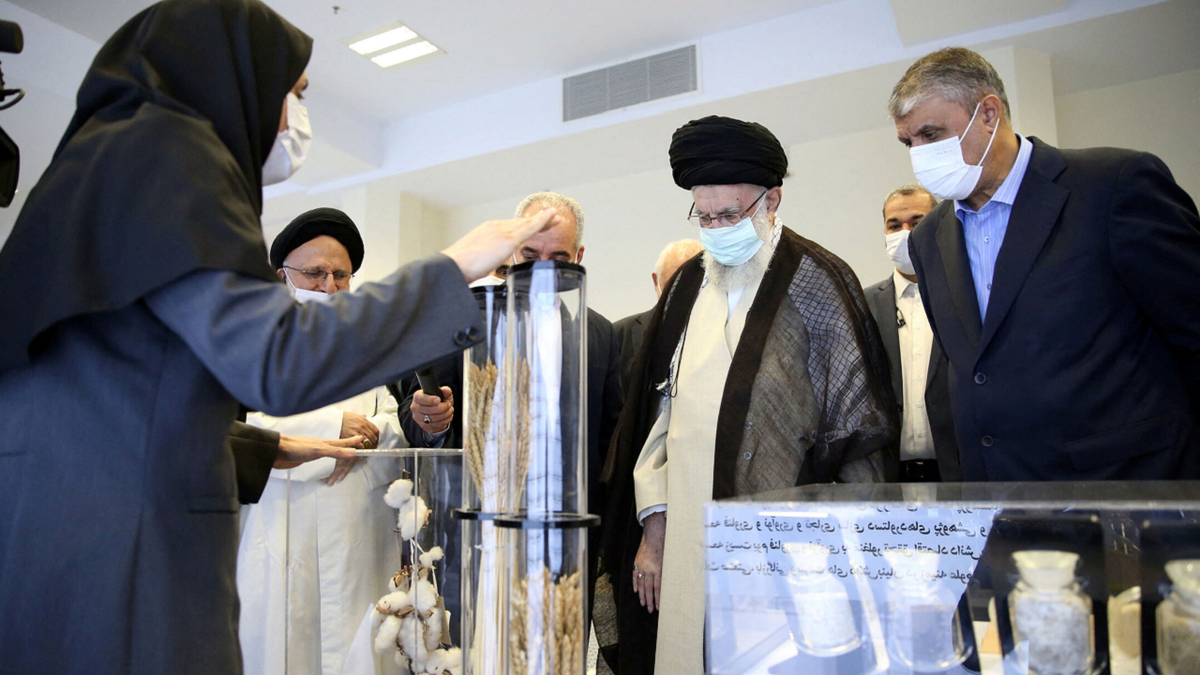
Iran’s Supreme Leader Ayatollah Ali Khamenei views Iranian nuclear achievements on Sunday, June 11. (Office of the Iranian Supreme Leader/WANA/Reuters)
Taleblu said, «Tehran’s counteroffer of indirect talks is the regime’s way of rejecting Trump while leaving the door open for talks that can be used as a shield against a potential preemptive attack.»
The president sent a letter to Khamenei expressing interest in making a deal on the nuclear issue. While increasing its military presence in the region, reports indicate that the Trump administration is considering indirect talks with Iran to curb the expansion of its nuclear program and avoid a direct confrontation.
Experts and observers of the region warn that Iran has used negotiating as a delaying tactic in the past and warn the Trump administration against entering into talks that might further embolden Iran.
«The Trump administration should impose full pressure on the regime in Iran given how weak the regime has become in the last several years. Indirect talks are the regime’s strategy of buying time so it can live to fight another day,» Alireza Nader, an independent analyst in Washington, D.C., and expert on Iran, told Fox News Digital.
Nader’s recommendation to Trump is to support the people of Iran and argued that the regime is much weaker than it appears.
«President Trump really wants a deal. Iran has a chance here to go back and negotiate, keep its civilian nuclear program but make concessions about its size and the duration of a deal,» Alex Vatanka, senior fellow at the Middle East Institute, told Fox News Digital.
«Trump is in a dominant position. Republicans in Congress fear him. Nothing can stop him—at least for now. But power is fickle. The longer he’s in the White House, the more vulnerable he may become. Iran shouldn’t wait for that,» Vatanka added.
PRESIDENT TRUMP CAN STOP IRAN’S MARCH TO NUCLEAR WEAPONS: ‘RE-ESTABLISH CREDIBLE MILITARY THREAT’, REPORT SAYS
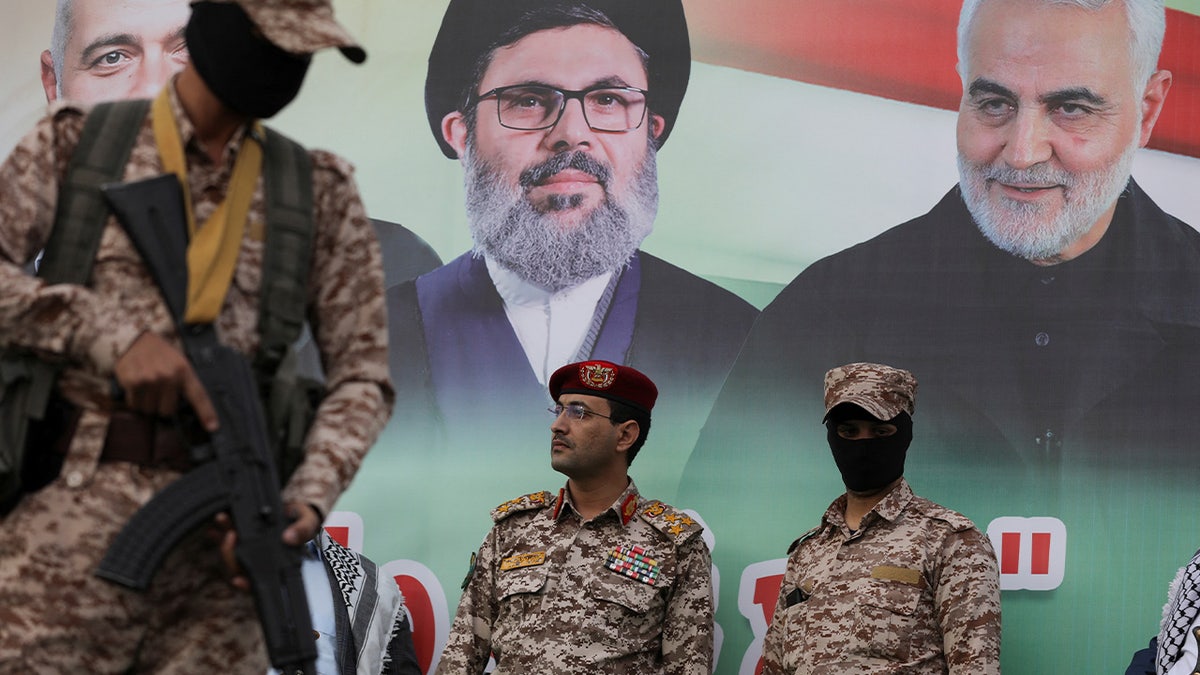
Houthi military spokesman Yahya Sarea attends a rally held by protesters, mainly Houthi supporters, to show support for Lebanon’s Hezbollah and Palestinians in the Gaza Strip, in Sanaa, Yemen, on Nov. 22, 2024. (REUTERS/Khaled Abdullah)
In an interview with Mark Dubowitz of the Foundation for the Defense of Democracies podcast, «The Iran Breakdown,» former Israeli Prime Minister Yair Lapid said that eventually, Israel will attack Iran’s nuclear facility, with or without the United States, because there is no other choice, according to Lapid.
Ali Larijani, an advisor to the supreme leader, said in an interview that although Iran does not seek a nuclear weapon, Tehran will have no choice but to build a nuclear weapon if the U.S. or Israel strike Iran.
The International Atomic Energy Agency reported in February that Iran has accelerated its nuclear program and has enriched uranium close to weapons-grade levels.
Danielle Pletka, senior fellow in Foreign and Defense Policy Studies at the American Enterprise Institute (AEI), told Fox News Digital that having additional military assets in the Middle East is sound policy given the threats that the U.S. and its allies face in the region.
For Pletka, the question is, what is the Trump administration looking for?
«A deal in which the Iranians do not fully get rid of their nuclear weapons program? If so, the president sets the United States up for the risk that Barack Obama inflicted on our allies and ourselves – merely delaying the Iranian nuclear program to a later date,» Pletka told Fox News Digital.
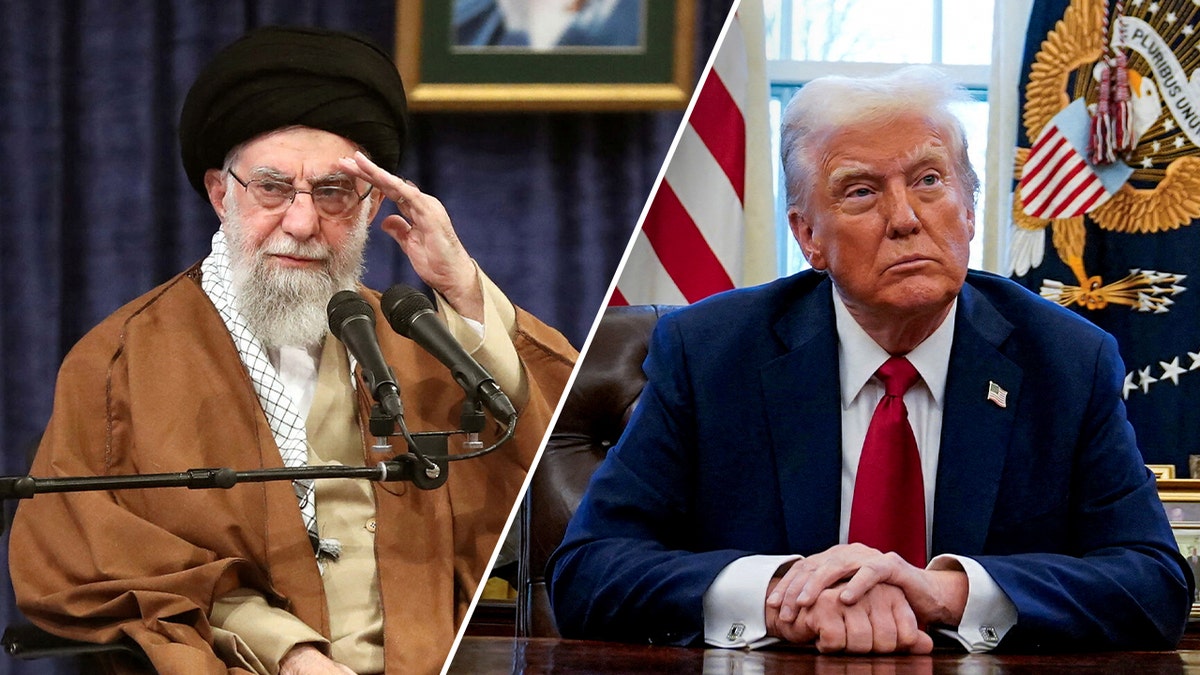
Iran’s Supreme Leader Ayatollah Ali Khamenei, left, and President Donald Trump. (Office of the Iranian Supreme Leader/WANA (West Asia News Agency)/Handout via REUTERS/Elizabeth Frantz/File Photo)
Pletka said it is strange that President Trump seems to envision a Joint Comprehensive Plan of Action (JCPOA)-like deal, and that has prompted a lot of criticism on Capitol Hill.
Trump originally withdrew from JCPOA, also known as the Iran nuclear deal, during his first term in 2018 and reapplied harsh economic sanctions. The Biden administration had initially looked at re-engaging with Iran on the nuclear issue upon taking office, but on-again-off-again talks went nowhere, complicated by Iran’s domestic politics and its role in supporting its terror groups in the region.
The other risk that the president runs, according to AEI’s Pletka, is being perceived as a paper tiger.
«He threatened Hamas with bombing that he never delivered. Now he’s threatening Iran with military action. But does he really mean it? Or is he just blowing hot air?» she said.
CLICK TO GET THE FOX NEWS APP
Pletka said, «There is an enormous amount of uncertainty around the president’s intentions, and that uncertainty is an opportunity for the Iranians to exploit.»
The Middle East Institute’s Vatanka said he believed that Trump could claim a potential win he can sell at home and say he got a better deal than President Obama did with the JCPOA, if Iran were to agree to permanently keep its enrichment level to a low level, unlike the expiration dates included in the JCPOA.
INTERNACIONAL
Vuelos cancelados y aerolíneas que desvían sus rutas: Cuba se queda sin combustible para los aviones
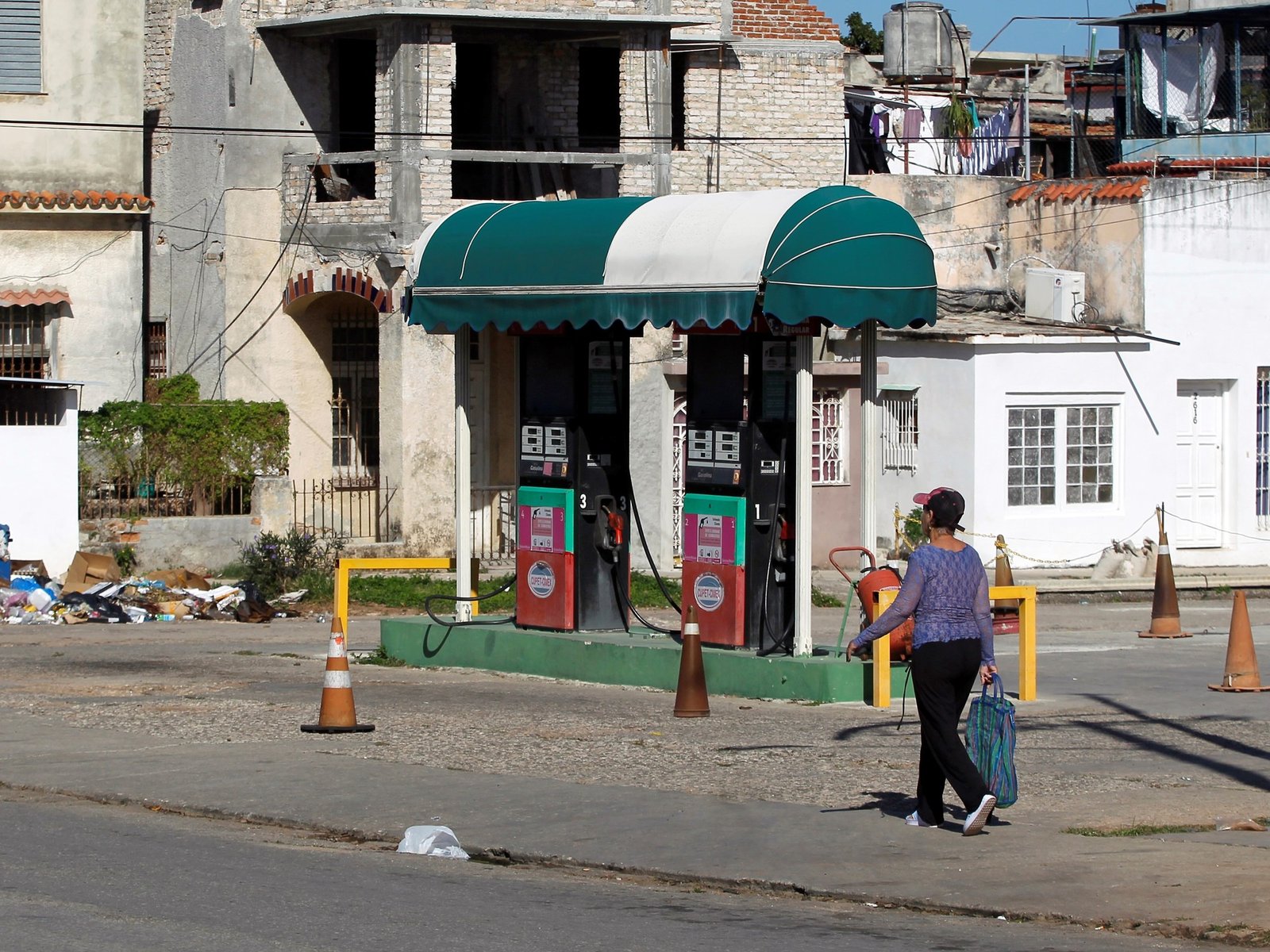
Cuba se queda este lunes sin combustible para aviones, una evidencia más de los graves efectos que está teniendo el estrangulamiento petrolero de Estados Unidos sobre una isla que se encontraba ya en una grave crisis económica y energética.
Como adelantó EFE, las autoridades cubanas informaron a las aerolíneas este domingo a través del servicio de comunicaciones Notam (Aviso a aviadores) y las compañías con vuelos diarios a la isla -principalmente estadounidenses, españolas, mexicanas y panameñas- empezaron a tomar medidas de emergencia.
Las aerolíneas españolas Air Europa e Iberia, con rutas diarias a La Habana (Cuba), informaron que a partir de ahora en sus vuelos desde la isla a Madrid incluirán una parada técnica de repostaje en República Dominicana.
Air Canada, la principal línea aérea de Canadá, anunció este lunes que de forma inmediata suspenderá sus servicios a Cuba por la falta de combustible.
Otras compañías canadienses, el primer mercado de origen del turismo a la isla, comenzaron a reajustar sus frecuencias y rutas, así como a ofrecer cancelación de reservas o cambios sin penalización a sus clientes.
El aviso de las autoridades cubanas en Notam afectaba a los nueve aeropuertos internacionales de Cuba y tenía, en principio, validez por un mes, del 10 de febrero al 11 de marzo.
El sector turístico completo, esencial para la economía cubana, está viéndose afectado por el asedio petrolero de Estados Unidos, que primero acabó con los envíos de Venezuela (3 de enero) y luego amenazó con aranceles a los países suministrasen crudo a la isla (29 de enero).
Entre las medidas de emergencia incluidas en el duro paquete anunciado por el Gobierno cubano para tratar de subsistir sin importaciones de petróleo (pese a que la isla sólo produce un tercio de sus necesidades energéticas) está la «compactación de infraestructuras hoteleras».
En efecto, según confirmaron a EFE este sábado fuentes del sector, varios hoteles del país -principalmente en Varadero y los cayos del norte- han cerrado sus puertas de urgencia y transferido sus turistas a otras instalaciones como medida de ahorro.
La hotelera española Meliá explicó a EFE que cerraron tres instalaciones en la isla de forma provisional, una decisión operativa «basada estrictamente en los niveles de ocupación» para optimizar recursos y con la prioridad de garantizar el mejor servicio y experiencia a los clientes.
El turismo en Cuba se encontraba ya en horas bajas por la conjunción de la pandemia, las sanciones estadounidenses y la crisis del país. El año pasado cerró con apenas 1,8 millones de visitantes internacionales, frente a los 4,7 de 2018.
El turismo había sido en Cuba una de las tres mayores fuentes de divisas, con las remesas y las misiones médicas (otros dos ámbitos en horas bajas).
La escalada de la presión estadounidense cae sobre la isla en su peor crisis económica en décadas, con escasez de bienes básicos (alimentos, combustible, medicinas), elevada inflación, dolarización parcial, prolongados apagones diarios, derrumbe de la producción, abultado déficit fiscal y una migración masiva.
El oficial Centro de Estudios de la Economía Cubana (CEEC) estima en su informe del segundo semestre del año pasado que el producto interno bruto (PIB) de la isla se contrajo un 5 % en 2025, con lo que la economía nacional habría caído más de un 15 % desde 2020.
El documento habla de una «coyuntura crítica» con «solapamiento de crisis» y de «un modelo económico agotado y sin resortes efectivos» para «transformar una realidad necesitada de cambios estructurales y una renovada capacidad de adaptación».
Sobre 2026, el CEEC advierte de un «escenario dominado por la incertidumbre» y percibe como optimista la previsión del Gobierno cubano de crecer un 1 %. Y eso, antes de la orden presidencial que amenaza con aranceles a quien suministre petróleo a la isla.
México, uno de los principales suministradores de Crudo a Cuba en 2025, optó por suspender los envíos de petróleo y mandar a la isla 814 toneladas de ayuda humanitaria. Los dos barcos militares mexicanos con alimentos y productos de higiene tienen previsto atracar en Cuba a mediados de este semana.
Con información de la agencia EFE
INTERNACIONAL
Entre dudas e internas en el chavismo, crece la expectativa por la libración masiva de presos políticos en Venezuela

La Asamblea Nacional de Venezuela, el Parlamento controlado en su inmensa mayoría por el chavismo, postergó hasta el jueves el tratamiento final de la ley de amnistía impulsada por la presidenta encargada, Delcy Rodríguez, bajo enorme presión de Donald Trump.
La reunión prevista para el martes fue aplazada sin explicaciones en medio de fuertes internas en el gobierno chavista y tras el nuevo arresto de un líder de la oposición.
El avance de la ley aumentó la expectativa por la liberación de los más de 600 presos políticos que se estima aún quedan en el país, entre ellos los argentinos Nahuel Gallo y Germán Giuliani.
Leé también: El show de Bad Bunny en el Super Bowl impactó en EE.UU. y reavivó el debate por las deportaciones de Trump
“En Venezuela no hace falta ninguna ley para liberar a Nahuel. Ellos saben que Nahuel es inocente desde el primer momento, pero obviamente siempre voy aplaudir todo aquello que permita la libertad, no solo de Nahuel sino de todos los inocentes que viven día a día la opresión en las cárceles en Venezuela”, dijo a TN la pareja del gendarme catamarqueño, María Alejandra Gómez.
Gallo lleva más de 14 meses detenido en Venezuela sin contacto con su familia y sin asesoría legal. Unas semanas después de su arresto, Nicolás Maduro lo acusó de planear el asesinato de Delcy Rodríguez.
Giuliani fue detenido en mayo de 2025 bajo cargos de narcotráfico.
La ley de amnistía jaqueada por el nuevo arresto de líder opositor
Pero la esperada aprobación de la norma quedó jaqueada por la nueva detención de Juan Pablo Guanipa, considerada la mano derecha de la líder opositora María Corina Machado, 24 horas después de su excarcelación registrada el domingo.
“Una persona fue detenida nuevamente por violar las condiciones sobre las cuales fue liberada”, dijo el ministro del Interior y Justicia, Diosdado Cabello, en una rueda de prensa. El ministro del Interior, Diosdado Cabello (Foto: REUTERS/Marco Bello)
El nuevo arresto de Guanipa impactó no solo en la oposición, sino también en la interna chavista. Cabello, representante del ala dura del gobierno, quedó en el medio de esa lucha de poder.
“No había pasado nada hasta la estupidez de unos políticos que creyeron que pueden hacer lo que les da la gana y embochinchar (alterar) el país, violando las propias condiciones sobre las cuales se les está dando libertad”, dijo.
Leé también: Estuvo preso en Venezuela con el argentino Germán Giuliani y contó cómo lo vio: “Mentalmente está consternado”
Guanipa divulgó videos y dio declaraciones tras su liberación que, a juicio de personeros del chavismo duro, no fomentaban la “reconciliación”. Desde el ala radical chavista se busca así “disciplinar” a los opositores liberados, algunos de ellos —como Perkins Rocha, asesor jurídico de Machado— que salieron en libertad el domingo con tobillera electrónica.
Poco después, se conoció que la Asamblea Nacional suspendió la sesión de este martes. La ley podría salir recién el jueves, en medio de una interna entre dos sectores enfrentados: por un lado el chavismo radical liderado por Cabello y por el otro Delcy Rodríguez y su hermano y titular del Parlamento, Jorge Rodríguez.
La asamblea sesiona normalmente los martes y jueves.
Los hermanos Rodríguez, impulsores de la iniciativa y considerados el sector pragmático del gobierno, están bajo una enorme presión de la Casa Blanca tras el ataque y captura de Maduro el 3 de enero.
Cuátos presos políticos quedan en Venezuela
El presidente de la Asamblea Nacional, Jorge Rodríguez, dijo el viernes pasado que entre este martes y el viernes se liberará a todos los presos políticos.
El Foro Penal, una ONG que monitorea estas excarcelaciones, dijo que desde el 8 de enero se liberó a 426 detenidos sobre un total de más de 800. Quedarían entonces más de 400 en distintas prisiones del país, aunque otras fuentes calculan que son más de 600. Familiares piden la liberación de los presos políticos (Foto: REUTERS/Fausto Torrealba)
Los hermanos Rodríguez quieren aprobar la ley lo más pronto posible, mientras crecen las dudas sobre si la norma alcanzará a todos los presos políticos y si servirá para cubrir con un manto de impunidad los crímenes y violaciones a los derechos humanos del gobierno chavista,
Las claves de la amnistía general impulsada en Venezuela
Varias ONG vienen alertando sobre los alcances de esta ley de amnistía, en especial porque se mantendrían vigentes leyes usadas como “herramientas de persecución” a opositores, como la llamada “Ley de odio” o la “Ley Bolívar”, que prevé penas de 30 años de cárcel a quienes respalden sanciones a Venezuela.
La ley en debate consta de 13 artículos y establece “una amnistía general y plena” a todas las personas que “hayan sido procesadas o condenadas por la presunta o comprobada comisión de delitos políticos o conexos” desde 1999 hasta enero de 2026.
Estarán excluidas las personas que hayan cometido violaciones graves de los derechos humanos, delitos de lesa humanidad, crímenes de guerra, homicidio intencional, tráfico de drogas “con pena mínima aplicable superior a nueve años de prisión” y “delitos contra el patrimonio público”.
Leé también: El presidente del Parlamento venezolano pidió perdón por las detenciones de presos políticos
Pero las dudas son consistentes. El director de la ONG Laboratorio de Paz, Rafael Uzcátegui, dijo que el artículo 8 impide demandas civiles contra el Estado, bloquea sanciones administrativas a funcionarios y anula responsabilidades políticas y patrimoniales.
“Es una forma de impunidad: no se absuelve, pero tampoco se hace justicia”, indicó.
Además, la ley refiere que la “confrontación política” fue impulsada “desde el extremismo”. La ONG sostiene que no reconoce que ese extremismo “también fue promovido desde el propio poder político”.
La Misión Internacional Independiente de Determinación de los Hechos para Venezuela se mostró cautelosa sobre el proyecto. Según advirtió, así como está redactada, la ley podría no aplicarse a personas que hayan sido acusadas o condenadas por delitos que, en apariencia, no son políticos, como aquellos contra el patrimonio público».
“Una amnistía de alcance limitado corre el riesgo de excluir a numerosas personas perseguidas por motivos políticos y no garantiza, por sí sola, la restitución plena de sus derechos”, advirtió María Eloísa Quintero, miembro de la misión.
Venezuela
INTERNACIONAL
Jeffries accuses Republicans of ‘voter suppression’ over bill requiring voter ID, proof of citizenship
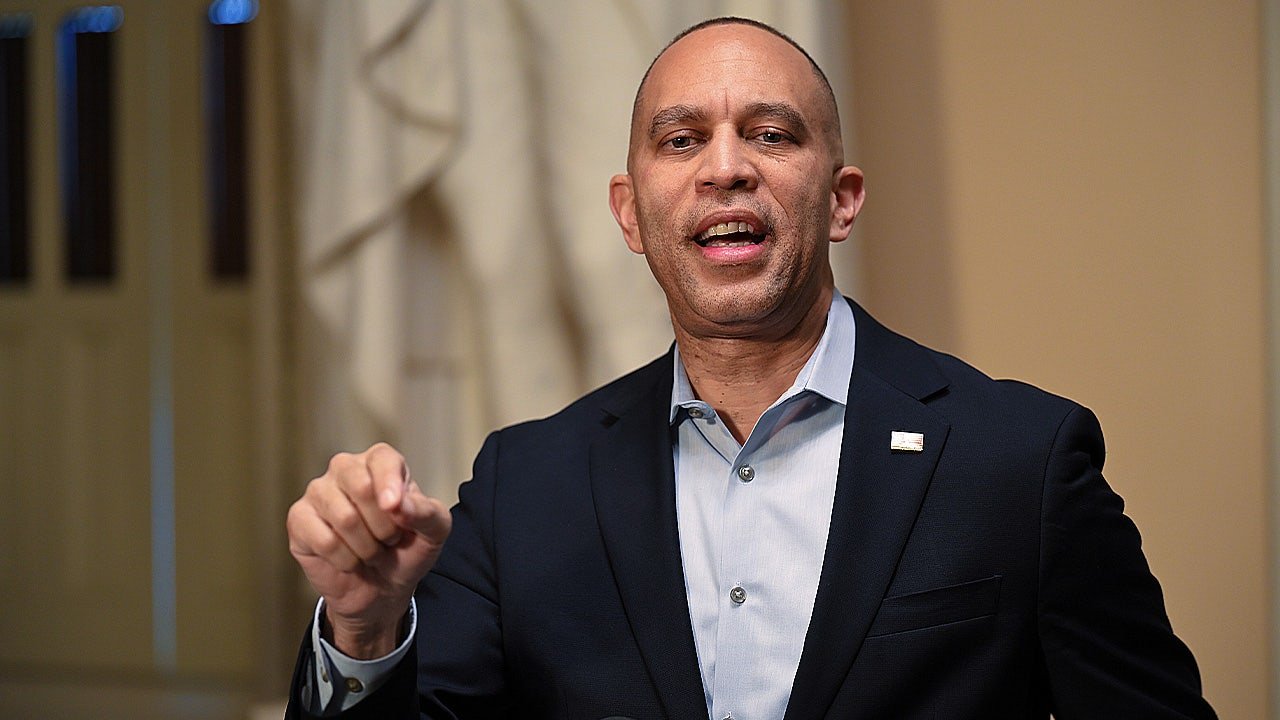
NEWYou can now listen to Fox News articles!
The House of Representatives’ top Democrat claimed Republicans’ election security bill was tantamount to «voter suppression» on Monday.
House Majority Leader Hakeem Jeffries, D-N.Y., criticized the House GOP-led SAVE America Act during his weekly press conference ahead of an expected vote on the bill coming as early as Wednesday.
«Republicans have adopted voter suppression as an electoral strategy. That’s what the so-called SAVE Act is all about,» Jeffries said.
He said the bill getting a vote this week is «worse than» a previous iteration simply called the Safeguarding American Voter Eligibility (SAVE) Act, which passed the House in April 2025 with support from all Republicans and four Democrats.
SCHUMER NUKES GOP PUSH FOR ‘JIM CROW-ERA’ VOTER ID LAWS IN TRUMP-BACKED SHUTDOWN PACKAGE
U.S. House Minority Leader Hakeem Jeffries speaks during a press conference on Capitol Hill on Nov. 3, 2025 in Washington, D.C. (Roberto Schmidt/Getty Images)
The main thrust of the SAVE Act was implementing a new proof of citizenship requirement in the voter registration process in all 50 states.
The new bill, led by Rep. Chip Roy, R-Texas, and Sen. Mike Lee, R-Utah, would also create a federal voter ID standard at the polls, requiring people to show a form of identification when casting a ballot in national elections.
Jeffries also pointed to a provision that would require information-sharing between state election officials and federal authorities in verifying citizenship on current voter rolls, accusing Republicans of trying to give Americans’ data to Immigration and Customs Enforcement (ICE).
SCHUMER FACES BACKLASH AFTER CALLING SAVE ACT ‘JIM CROW’ DESPITE PREVIOUS ALLEGATION FALLING FLAT
«This version, as I understand it, will actually give [the Department of Homeland Security] the power to get voting records from states across the country. Why would these extremists think that’s a good idea?» Jeffries said.

Speaker of the House Mike Johnson, R-La., gestures as he meets with reporters ahead of a key procedural vote to end the partial government shutdown, at the Capitol in Washington, Tuesday, Feb. 3, 2026. (J. Scott Applewhite/AP Photo)
«Who’d want DHS and ICE, who have been brutally, viciously and violently targeting everyday Americans, to have more data about the American people? It’s outrageous. Something is really wrong with these folks. I think they’re trying to lose elections at this point.»
There is no validated evidence to date that non-citizen voting has swayed the results of any federal election.
But Republicans have argued that the influx of illegal immigrants under the Biden administration has made the problem a real possibility in coming elections.
Nevertheless, voter ID provisions have proven popular in multiple public surveys.
A Pew Research Center poll released in August 2025 showed a whopping 83% of people supported government-issued photo ID requirements for showing up to vote, compared to just 16% of people who disapproved of it.

Voters stand in line before casting ballots at a polling location in Dallas, Texas, on Nov. 8, 2022. (Nitashia Johnson/Bloomberg via Getty Images)
CLICK HERE TO DOWNLOAD THE FOX NEWS APP
Jeffries also said the bill would die in the Senate, where at least some Democrats are needed under current rules to overcome a filibuster and advance the legislation.
«It’s not going to pass. If it squeaks by the House, it’s dead on arrival in the Senate. They’re wasting time,» he said.
The real possibility of the bill failing in the Senate is why a group of House conservatives are pushing for Senate Majority Leader John Thune, R-S.D., to upend the chamber’s rules on the filibuster to get rid of the 60-vote threshold needed to overcome one. Thune has not committed to any route.
house of representatives politics,house of representatives,politics,democrats

 CHIMENTOS3 días ago
CHIMENTOS3 días agoNatalie Weber contó toda la verdad del coqueteo de Sabrina Rojas a Mauro Icardi en un boliche: “Yo sé lo que pasó esa noche y te puedo decir que Sabrina no fue”

 ECONOMIA2 días ago
ECONOMIA2 días agoEl sector industrial advierte que la apertura económica exige eliminar las distorsiones internas

 CHIMENTOS2 días ago
CHIMENTOS2 días agoMirtha Legrand se quebró desconsolada al hablar de la renuncia de Jimena Monteverde a su mesaza















